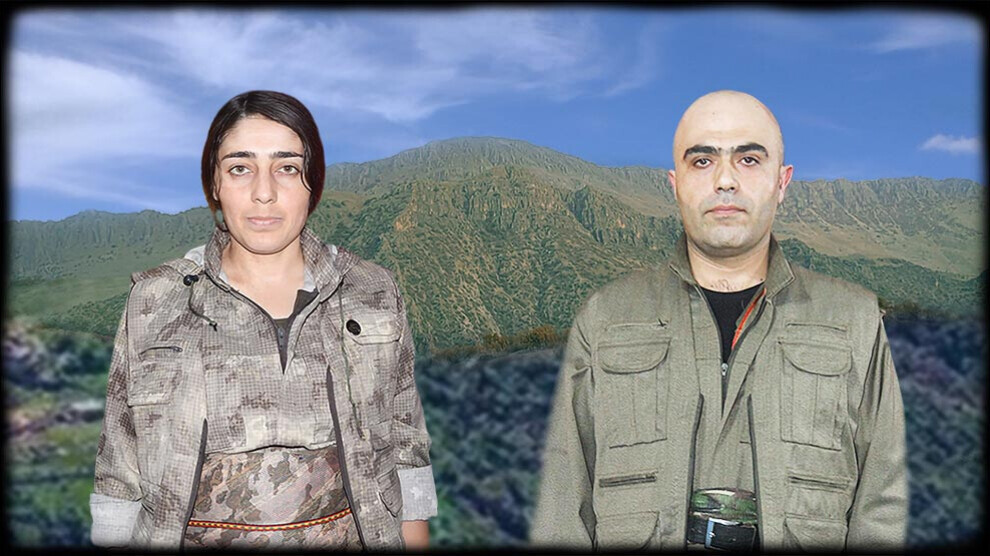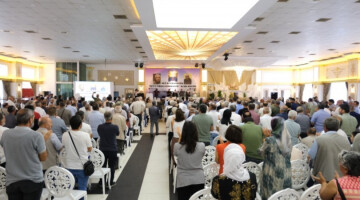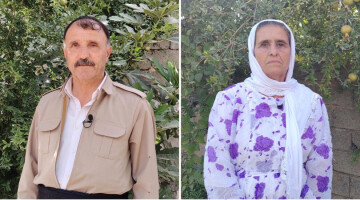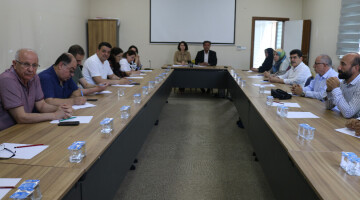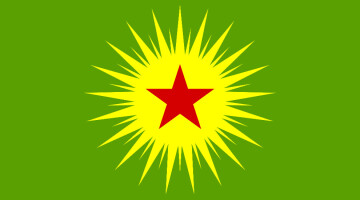Guerrilla fighters Nurî Yekta and Amara Amed were martyred at Girê Hekarî in Southern Kurdistan in June, announced the press centre of the People's Defence Forces (HPG) on Saturday. Pointing to the systematic war crimes committed by Turkey through the use of internationally outlawed weapons, the HPG statement includes the following:
"The Turkish colonial state, which aims at genocide, launched an invasion in Zap, Avaşîn and Metîna regions on 14 April 2022, against which the Kurdistan Freedom Guerrilla has established a great resistance front with Apoist willpower. The Turkish army, despite the technical military means at its disposal and the use of paid soldiers, gangs, counterforces and special units, as well as the support of foreign powers and Kurdish traitors, has not been able to break the resistance of the guerrillas at Girê Hekarî. A handful of brave guerrilla fighters have shown how a huge army mobilising all possibilities for this war can only be stopped by conviction, consciousness and willpower. Of course, it was not easy to create this resistance. It could only be realised through gigantic labour, sweat, great patience, belief in freedom, solidarity with Rêber Apo [Abdullah Öcalan], the martyrs and our people on the basis of the Apoist ideology.
The Turkish occupation forces are acting far from any human ethics and the law of war and have used banned tactical nuclear bombs and chemical weapons to break the resistance of the Kurdistan guerrillas after massive losses in the Girê Hekarî resistance area. Although the war crimes of the Turkish army have been documented quite a few times and presented to the world public, there is no strong reaction to it and the use of chemical weapons has taken a systematic form.
The resistance at Girê Hekarî was led by commander Nurî Yekta, who was martyred together with fighter Amara Amed in an attack with a tactical nuclear bomb prohibited under international law. We extend our condolences to the precious patriotic families of our martyrs and to the entire people of Kurdistan and will keep alive the memory of our companions who sacrificially fought for a free life of Rêber Apo and the Kurdish people with their own identity in their own land, stood against the occupation and fell for it. We will denounce war crimes always and everywhere and show the bloody face of the Turkish state aiming at genocide to the whole world. And we will avenge our martyrs."
Regarding the identity of the martyrs, the HPG gave the following information:
 |
Nom de Guerre: Nuri Yekta
First-Last Name: Cevat Etarek
Birthplace: Mahabad
Mother's-Father's Name: Zeynep – Muhammed
Date and Place of Martyrdom: 15 June 2022 / Metîna
|
 |
Nom de Guerre: Amara Amed
First-Last Name: Ayşe Toprak
Birthplace: Batman
Mother's-Father's Name: Fatma – Mehmet
Date and Place of Martyrdom: 3 June 2022 / Metîna
|
NURÎ YEKTA
Nurî Yekta was born in Nexede near Mahabad in Rojhilat (Eastern Kurdistan). His birthplace has a cosmopolitan population structure with a high level of political awareness; many leading Kurdish resistance fighters have emerged from Nexede. Nurî Yekta grew up in a family that was marked by love for their own country and the Kurdish uprisings. Although the family was doing well economically, he aspired to a life based on his own work and socialist ideas. He went to school for ten years and studied literature for two years.
The internationally organised abduction of Abdullah Öcalan to Turkey on 15 February 1999 was a turning point for Nurî Yekta. He wanted to join the PKK's armed struggle, but was still too young to do so. Therefore, he worked in different areas of the liberation movement until 2001, before he took to the mountains and completed basic training. After that, he was with comrades from the party leadership for a while, who gave him important basics for his revolutionary life. He worked in the revolutionary youth movement and participated as a delegate in the first session of Kongra-Gel. After Soranî and Persian, he also learned Kurmancî and Turkish.
Nurî Yekta then went to Rojava to organise young people for the revolutionary struggle. In 2004, he took part in the Qamişlo uprising in a leading position. In November 2004, he was arrested and severely tortured by the Syrian regime. For months he was interrogated by both the Syrian and the Turkish states and did not say a word despite brutal torture. When the "Arab Spring" broke out in 2011 after seven and a half years in prison, he was offered an amnesty by the Syrian regime. To this he replied: "I am not someone who needs amnesty, I have only fulfilled my revolutionary task." He was then extradited to Iran and arrested there. After another year and a half in prison, he managed to escape from prison and went back to the mountains of Kurdistan, where he took on various jobs and did further training at the central party school "Mazlum Doğan".
At his own suggestion, he then went to Aleppo to fight against the Islamist threat. In the Syrian dungeon he had learned Arabic and in Aleppo he worked to organise the population and its defence. He was injured in battle and immediately returned to his task after recovering. In the process, he distinguished himself with his courage, tactical creativity and coordination skills, and with his fighting spirit and sincerity, he became an unforgettable commander for the people of Aleppo and the fighters.
After completing his task in the Rojava revolution, Nurî Yekta went back to the mountains to fight against the Turkish state. At the Haki Karer Academy, he studied the requirements of modern guerrilla warfare and passed on his experience to others. After further training, he was transferred to the command of the Metîna region and worked on building the infrastructure for the defence of the guerrillas. When the Turkish invasion of Metîna began, he planned and coordinated the resistance in the region and carried out successful actions at Girê Hekarî together with his companions. On 15 June 2022, he died due to a war crime committed by the Turkish army.
AMARA AMED
Amara Amed was born in Beşiri district of Batman. Her family belongs to the Kurdish Reşkotî tribe and is close to the liberation movement. Amara Amed sympathised with the guerrillas as a child and felt great pain in the face of the suffering of the Kurdish people. She worked to support her family while looking for ways to support the liberation struggle. On Newroz 2017, she joined the guerrillas and went to the mountains where she studied the ideology of the PKK and especially women's liberation.
She participated in the free life with great enthusiasm and learned the basics of guerrilla struggle. In 2019, she took part in advanced military training and was then in practice in Gare. In 2021, she trained as a sniper and went to Metîna, where she resisted the Turkish occupation with great sacrifice as a professional fighter of the YJA Star at Girê Hekarî that year, inflicting heavy losses on the enemy as a sniper. She was the first female fighter to die in the resistance area through the use of prohibited combat equipment.

